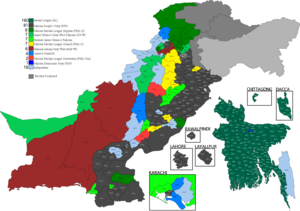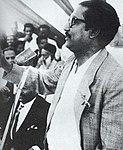1970年巴基斯坦大選
| |||||||||||||
| |||||||||||||
 顯示議會選區和獲勝政黨的地圖 | |||||||||||||
| |||||||||||||
1970年巴基斯坦大選於同年12月7日舉行大選。 這是巴基斯坦獨立以來的第一次大選,也是孟加拉獨立前唯一一次舉行的大選。投票在300個一般選區進行,其中162個在東巴基斯坦,138個在西巴基斯坦。 另有13個席位留給婦女(其中7個在東巴基斯坦,6個在西巴基斯坦),由國民議會成員選舉產生。[1]
選舉結果是人民聯盟的勝利,贏得了絕對多數的席位,收穫了東巴基斯坦162個一般席位中的160個和所有7個女性預留席位。巴基斯坦人民黨僅贏得了81個普通席位和5個女性席位,全部位於西巴基斯坦。在十天后舉行的省級選舉中,人民聯盟再次在東巴基斯坦贏得決定性多數,而人民黨則在旁遮普省和信德省獲得勝利,馬克思主義的政黨民族人民黨(National Awami Party)則在西北邊境省和俾路支省取得勝利。
然而,國民議會並沒有如期召開會議,這是因為葉海亞·汗總統和人民黨主席佐勒菲卡爾·阿里·布託不希望聯邦政府中有一個來自東巴基斯坦的政黨。[2]相反,葉海亞任命努魯爾·阿明為總理,要求他為人民黨和人民聯盟達成妥協。但是,由於就職典禮的延遲,東巴基斯坦地區爆發了嚴重的動盪,最後在巴基斯坦軍方發動探照燈行動後,局勢急速惡化及升級為內戰,導致孟加拉國獨立戰爭及1971年印巴戰爭。[3]由於戰爭的失利,葉海亞最後於1971年12月20日被逼下台,權力移交至布託手中。國民議會最終在1972年成功組成,但這時東巴基斯坦地已獨立成孟加拉國。1973 年,巴基斯坦頒布新憲法,布托成為了總理。
背景[编辑]
1956年3月23日,巴基斯坦頒布憲法,正式從自治領轉變為共和國政體。儘管第一次大選定於1959年初舉行,但因嚴重的政治不穩最終取消了,首任總統伊斯坎德爾·米爾扎實施戒嚴並將權力移交給軍隊。1960年2月17日,阿尤布·汗總統成立委員會,負責研究該國的政治框架。該委員會於1961年4月29日提交了報告,並在此報告的基礎上制定了新憲法。新憲法取消了1956年憲法下的議會體制,轉成總統制。在新制度下,總統選舉於1965年1月2日舉行,結果是阿尤布汗獲勝。但隨住時間過去,反對總統阿尤布汗的政治反對聲越來越高。在東巴基斯坦,人民聯盟領導人謝赫·穆吉布·拉赫曼是反對總統的主要領導人之一。1966年,他發起了以爭取東巴基斯坦更大自治權為目標的六點運動。[4]
1968年,拉赫曼被阿尤布·汗政府指控他與印度密謀破壞巴基斯坦的穩定及煽動叛亂。 雖然穆吉布和印度之間關於東巴基斯坦分裂的陰謀並沒有得到證實,[5]但穆吉布和人民聯盟在1962年和1965年戰爭之後的確與印度政府官員舉行了秘密會議。[6]此案引發了東巴基斯坦地區的起抗議,其中包括一系列大規模示威及零星衝突。在西巴基斯坦,曾在阿尤布汗總統手下擔任外交部長的佐勒菲卡爾·阿里·布託於1967年辭去職務,並於同年成立了巴基斯坦人民黨(PPP),同樣反對阿尤布·汗總統的統治。[5]
1969年3月26日,阿尤布汗屈服於政治壓力,將權力移交給巴基斯坦陸軍總司令葉海亞·汗將軍。葉海亞汗接任總統後實行戒嚴,廢除1962年憲法。1970年3月31日,葉海亞·汗總統宣布了一項法律框架令(LFO),要求直接選舉一院制的立法機構。這時許多西巴基斯坦人在擔心東翼會要求全國省級程度的自治。[7]法律框架令的目的是確保未來的憲法將在選舉後編寫,以保護巴基斯坦的領土完整及伊斯蘭意識形態。[8][9]
葉海亞將西巴基斯坦省分成四個省:旁遮普省、信德省、俾路支省和西北邊境省。由於代表制是按人口比例來制定的,而東巴基斯坦的人口比西巴基斯坦四省的人口加起來還多,所以前者在國民議會中佔有一半以上的席位。葉海亞輕視有關拉赫曼及印度干涉的報導,[10]他並不相信人民聯盟真的會橫掃東巴基斯坦的議席。[11]
選舉前一個月,颶風波拉襲擊了東巴基斯坦。 這是世界歷史上最致命的熱帶氣旋,造成約五十萬人死亡, 巴基斯坦中央政府的遲緩反應受到孟加拉地區的嚴厲批評。[12]
選舉結果[编辑]
登記選民總數為56,941,500人,其中31,211,220人來自東巴基斯坦,25,730,280人來自西巴基斯坦,投票率接近63%。
| 政党 | 票数 | % | |
|---|---|---|---|
| 孟加拉人民聯盟 | 12,937,162 | 39.20 | |
| 巴基斯坦人民黨 | 6,148,923 | 18.63 | |
| Jamaat-e-Islami | 1,989,461 | 6.03 | |
| 穆斯林理事會聯盟 | 1,965,689 | 5.96 | |
| 巴基斯坦穆斯林聯盟(凱尤姆·汗派) | 1,473,749 | 4.47 | |
| 伊斯蘭神學者協會 | 1,315,071 | 3.98 | |
| 巴基斯坦伊斯蘭神學者協會 | 1,299,858 | 3.94 | |
| 穆斯林大會聯盟 | 1,102,815 | 3.34 | |
| 民族人民黨 | 801,355 | 2.43 | |
| 巴基斯坦民主黨 | 737,958 | 2.24 | |
| Jamiat Ulema-e-Islam (Thanvi) | 521,764 | 1.58 | |
| 其他政黨 | 387,919 | 1.18 | |
| 獨立人士 | 2,322,341 | 7.04 | |
| 总共 | 33,004,065 | 100.00 | |
| 已登记选民/投票率 | 56,941,500 | – | |
| 资料来源:Nohlen et al.,[13] Bangladesh Documents | |||
餘波[编辑]
由於巴基斯坦人民黨不希望人民聯盟組成政府,葉海亞·汗總統遲遲沒有召開國會。這在東巴基斯坦引起巨大動盪,最終升級為內戰,導致孟加拉國獨立戰爭及1971年印巴戰爭。在孟加拉獨立的四天後,葉海亞辭職,布託於1973年成為巴基斯坦總理。[3]
另見[编辑]
參考資料[编辑]
- ^ Craig Baxter (1971) "Pakistan Votes – 1970" Asian Survey, volume 11, number 3, pp197–218
- ^ 1970 polls: When election results created a storm (页面存档备份,存于互联网档案馆) Dawn, 8 January 2012
- ^ 3.0 3.1 History: Bhutto, Mujib and the generals (页面存档备份,存于互联网档案馆) Dawn, 4 May 2019
- ^ Uddin, Sufia M. Constructing Bangladesh: Religion, Ethnicity, and Language in an Islamic Nation, Chapel Hill. The University of North Carolina Press. 2006. ISBN 0807830216.
- ^ 5.0 5.1 Ian Talbot. Pakistan: A Modern History. St. Martin's Press. 1998: 193. ISBN 978-0-312-21606-1.
The Agartala contacts however did not provide solid evidence of a Mujib-India secessionist conspiracy in East Pakistan
- ^ Ian Talbot. Pakistan: A Modern History. St. Martin's Press. 1998: 190. ISBN 978-0-312-21606-1.
It is now clear that Mujib did hold secret discussions with local Indian leaders there in July 1962. Moreover, following the 1965 war there were meetings between Awami League leaders and representatives of the Indian Government at a number of secret locations.
- ^ Ian Talbot. Pakistan: A Modern History. St. Martin's Press. 1998: 193. ISBN 978-0-312-21606-1.
When this duly arrived. the western wing's nightmare scenario materialised: either a constitutional deadlock, or the imposition in the whole of the country of the Bengalis' longstanding commitment to unfettered democracy and provincial autonomy.
- ^ Ian Talbot. Pakistan: A Modern History. St. Martin's Press. 1998: 193. ISBN 978-0-312-21606-1.
Yahya had made some provision to safeguard the constitutional outcome through the promulgation of the Legal Framework Order (LFO) on 30 March 1970. It set a deadline of 120 days for the framing of a constitution by the National Assembly and reserved to the President the right to authenticate it.
- ^ Ian Talbot. Pakistan: A Modern History. St. Martin's Press. 1998: 194. ISBN 978-0-312-21606-1.
It would also have to enshrine the following five principles: an Islamic ideology...and internal affairs and the preservation of the territorial integrity of the country
- ^ Ian Talbot. Pakistan: A Modern History. St. Martin's Press. 1998: 194. ISBN 978-0-312-21606-1.
He also refused to countenance intelligence service reports both of Mujib's aim to tear up the LFO after the elections and establish Bangladesh and of India's growing involvement in the affairs of East Pakistan.
- ^ Ian Talbot. Pakistan: A Modern History. St. Martin's Press. 1998: 193. ISBN 978-0-312-21606-1.
From November 1969 until the announcement of the national election results, he discounted the possibility of an Awami League landslide in East Pakistan.
- ^ Jin Technologies. General Elections 1970. Story of Pakistan. 2003-06-01 [2007-04-15]. (原始内容存档于2020-12-28).
- ^ Dieter Nohlen, Florian Grotz & Christof Hartmann (2001) Elections in Asia: A data handbook, Volume I, p686 ISBN 0-19-924958-X
| |||||||||||||||||||||||||||
| ||||||||||||||||||||||||||||||||||
| |||||||||||||||||||||||||||||||||||||||||||||||||||||||||||||||||||||||||||||||||||||


